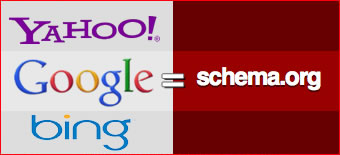
FOLLOW US ON FACEBOOK!
 By: Navneet Kaushal
By: Navneet Kaushal2011-06-06
Google, Bing and Yahoo! Have announced their coming together to with schema.org which is for the webmasters to help search engines their websites better. This in turn can be done by adding the markup to the websites' pages.
 |
| Big 3's Joint Effort: Schema.org! |
Here are some of the relevant details:
- New Types of Markups " More than 100 have been added. A few of the popular ones are:
Creative works: CreativeWork, Book, Movie, MusicRecording, Recipe,TVSeries
- Embedded non-text objects: AudioObject, ImageObject, VideoObject
- Event
- Organization
- Person
- Place, LocalBusiness, Restaurant
- Product, Offer, AggregateOffer
- Review, AggregateRating
2. Microdata Being Used " This is format used. To know more check out the Getting Started guide.
3. The existing rich snippet markup format will still be supported.
4. The Testing Tool " To check the accuracy of data parsing, rich snippetstesting tool.
Still more can be found at Rich Snippets schema.org FAQ.
Comments
View All Articles by Navneet Kaushal
About the Author:
Nav is the founder and CEO of PageTraffic, a premier search engine company known for its assured SEO service, web design and development, copywriting and full time SEO professionals.
Navneet has wide experience in natural search engine optimization, internet marketing and PPC campaigns. He is a prolific writer and his articles can be found in the "Best Articles" section of many websites and article banks. As a search engine analyst , he has over 9 years of experience and his knowledge is in application here.
What is Schema.org?
This site provides a collection of schemas, i.e., html tags, that webmasters can use to markup their pages in ways recognized by major search providers. Search engines including Bing, Google and Yahoo! rely on this markup to improve the display of search results, making it easier for people to find the right web pages.
Many sites are generated from structured data, which is often stored in databases. When this data is formatted into HTML, it becomes very difficult to recover the original structured data. Many applications, especially search engines, can benefit greatly from direct access to this structured data. On-page markup enables search engines to understand the information on web pages and provide richer search results in order to make it easier for users to find relevant information on the web. Markup can also enable new tools and applications that make use of the structure.
A shared markup vocabulary makes easier for webmasters to decide on a markup schema and get the maximum benefit for their efforts. So, in the spirit of sitemaps.org, Bing, Google and Yahoo! have come together to provide a shared collection of schemas that webmasters can use.





